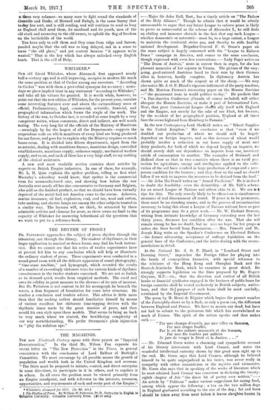WHITAKER.*
OUR old friend Whitaker, whose Almanack first appeared nearly half-a-century ago and is still improving, occupies in modern life much the same position as that of Cocker among our ancestors. " According to Cocker " was with them a proverbial synonym for accuracy ; nowa- days we place implicit trust in any statement " according to Whitaker," and take all his virtues for granted. It is worth while, however, to point out that the new edition of Whitaker, for the present year, contains some interesting features over and above the extraordinary mass of official, Parliamentary, legal, commercial, scientific, financial, and geographical information which forms the staple of the work. The history of the war, to October last, is recorded at some length by a very competent writer, whose comments, direct and indirect, are well worth noting. The very long list of the officials of the Ministry of Munitions —seemingly by far the largest of all the Departments—suggests the stupendous scale on which munitions of every kind are being produced for our forces, and goes far to explain why the Ministry requires so much house-room. It is divided into fifteen departments, apart from the secretariat, dealing with munitions finance, munitions design, controlled establishments, munitions supply, ordnance supply, mechanical warfare supply, and so on, and each of these has a very large staff, to say nothing of the clerical assistants.
A new and most readable section contains short articles by experts on British Empire industries. In one of these, for example, Mr. L. H. Quin explains the spelter problem, telling us first what Macaulay's schoolboy would know, that spelter is the commercial term for unmanufactured zinc, and showing how before the war Australia sent nearly all her zinc concentrates to Germany and Belgium, who sold us the finished product, so that we should have been virtually deprived of the metal had not America come to the rescue. Asbestos, marine insurance, oil fuel, explosives, coal, coal tar, wool and cotton, tube-making, and electric lamps are among the other subjects treated in a similar way. The layman will, we think, be attracted by these admirable articles and clamour for more, as there seems no limit to the capacity of Whitaker for answering beforehand all the questions that wo want to put to a reference-book.


































 Previous page
Previous page